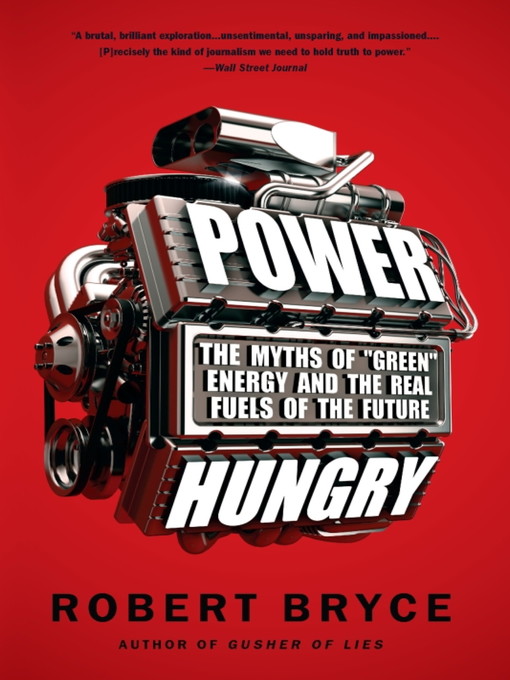Fueling our society requires more than sentiment and rhetoric; we need to make good decisions and smart investments based on facts. In Power Hungry, Bryce provides a supertanker-load of footnoted facts while shepherding readers through basic physics and math. And with the help of a panoply of vivid graphics and tables, he crushes a phalanx of energy myths, showing why renewables are not green, carbon capture and sequestration won't work, and even — surprise! — that the U.S. is leading the world in energy efficiency. He also charts the amazing growth of the fuels of the future: natural gas and nuclear.
Power Hungry delivers a clear-eyed view of what America has "in the tank," and what's needed to transform the gargantuan global energy sector.
-
Creators
-
Publisher
-
Release date
April 26, 2011 -
Formats
-
Kindle Book
-
OverDrive Read
- ISBN: 9781610390439
-
EPUB ebook
- ISBN: 9781610390439
- File size: 1884 KB
-
-
Languages
- English
-
Reviews
-
Library Journal
May 1, 2010
Most Americans view green jobs and green energy as our path to a clean energy future. Not so fast, proclaims energy journalist Bryce ("Gusher of Lies"); he challenges the scalability of renewable energy required for the world's enormous energy demand and explains why hydrocarbons (oil, coal) will be needed for a long time. With a strong stab at T. Boone Pickens's wind plan, he discredits wind power as a solution to environmental problems because all wind turbines must be backed up with gas-fired generators. Bryce considers unrealistic such ideas as carbon capture and sequestration, cellulosic ethanol, and electric cars. The solution for transitioning to a cleaner, lower-carbon future is N2Nnatural gas to nuclearbecause it has a higher power density and can provide the quantities of energy we need. VERDICT Bryce, whose home has solar panels, uses copious facts and research to make a compelling case that renewable sources have their place in our energy future but they aren't the viable panacea we're led to believe. Recommended for readers interested in both sides of the energy debate.Eva Lautemann, Georgia Perimeter Coll. Lib., ClarkstonCopyright 2010 Library Journal, LLC Used with permission.
-
Kirkus
March 1, 2010
"Oil is greener than nearly everything else that might replace it," writes Texas-based energy journalist and Energy Tribune managing editor Bryce in this contrarian, discontented approach to renewable energy
Energy sources must be judged, the author writes, by the four imperatives: power density, energy density, cost and scale. By that measure, oil is a good source of energy, while corn ethanol is not, since corn-ethanol production requires huge swaths of agricultural land put in the service of making something that is inferior to gasoline, containing"just two-thirds of gasoline's heat content." So far, so good—and indeed, the ethanol craze has already passed. But Bryce has it in for other much ballyhooed forms of energy production as well. Wind doesn't cut it because it takes lots of land to build towers that in turn don't produce much electricity, whereas a coal-burning plant performs wonders. The author harbors special hopes for nuclear energy, observing that many of its former foes—Stewart Brand notably among them—have since recanted. He is right to note that even if the United States succeeds in reducing carbon emissions to Kyoto Protocol levels, the rest of the world, and particularly the energy-poor world, will not"ignore the relatively low-cost power than can be derived from hydrocarbons." Though his arguments will provide comfort to the drill-baby-drill set, Bryce's recommendations are not without qualifications. He opposes mountaintop removal for coal, for instance, and has hope for an expanded role for solar power. Though he defends some of the old sources of energy production by assuming that technological improvements will remediate environmental damage, the author seems reluctant to allow that renewable forms of energy are not static—wind generation technology is steadily improving, for instance, while biofuels are becoming ever easier and more cost-effective to produce. A little less sneering and fewer straw men would have improved this statistics-rich and generally capably argued case.
Al Gore won't be blurbing this one, but advocates of renewable energy should familiarize themselves with the book, since oil, gas and coal lobbyists surely will.(COPYRIGHT (2010) KIRKUS REVIEWS/NIELSEN BUSINESS MEDIA, INC. ALL RIGHTS RESERVED.)
-
Loading
Why is availability limited?
×Availability can change throughout the month based on the library's budget. You can still place a hold on the title, and your hold will be automatically filled as soon as the title is available again.
The Kindle Book format for this title is not supported on:
×Read-along ebook
×The OverDrive Read format of this ebook has professional narration that plays while you read in your browser. Learn more here.


